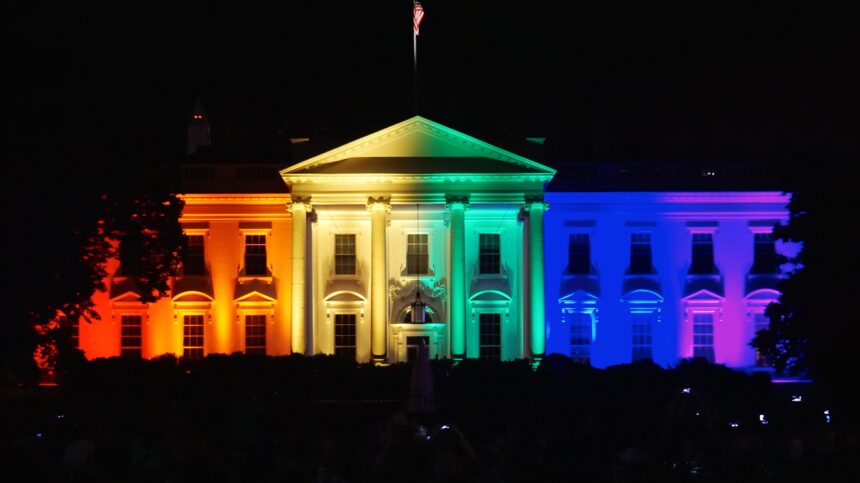“The only way the gay rights movement can succeed in making society accept homosexuality as natural, normal, moral, and healthy is to first de-Christianize that society … and they are making headway.”
That was the warning of paleoconservative commentator Pat Buchanan in his 2001 book, The Death of the West. His point was clear: there could be no coexistence between a traditional, biblically guided America and surging liberal cultural movements. The former would necessarily be sacrificed for the latter.
How correct was he? The answer isn’t hard to find. From 2009 to 2019, the number of American adults who identify as Christian dropped 12 percentage points to 65 percent, according to Pew Research Center. In 2021, Gallup reported that American approval for same-sex marriage reached 70 percent for the first time. This reveals a virtual inversion from 1997, when the ratio was 30-percent approval and 70-percent disapproval. Self-reported Christian faith has evidently declined, whereas support for homosexual behaviors has increased dramatically.
Yet these numbers still leave a gap in our understanding: how can 70 percent of people support same-sex marriage in a country in which nearly two-thirds still identify as Christian? The answer lies in the failure of America’s vanguards of tradition (that is, both the churches and the conservative movement) to show an ounce of moral courage. Both Christians and conservatives, among whom there is a strong overlap, were once ardent defenders of traditional relationships and marriage in America. That has now changed.
Many American churches now skirt around the question of homosexuality. Some even openly embrace it. In 2012, Episcopal churches in America started offering a new rite to recognize homosexual relationships. “We are proud to be a church that offers blessing of same-sex unions,” said Rector Catherine Gregg, of Grace Episcopal Church in St. George, Utah. Some have gone further, with the Unitarian Universalist Association (UUA) proudly flying rainbow flags in front of their congregations. “With our blessing let all love be sacred, / All unions safeguarded,” reads the “Rainbow Flag Dedication” on the UUA website.
No wonder so many self-proclaimed Christians now support the homosexual agenda. Their churches are promoting it.
The gay takeover of American conservatism has been even stronger. As late as 2016, opposition to same-sex marriage was still the mainstream stance in the Republican Party. “I’m just for traditional marriage,” Donald Trump remarked in a 2015 interview. This was a sentiment reflected across the field of 2016 Republican candidates.
Yet the cracks were starting to show. On Oct. 30, 2016, then-Republican nominee Trump would wave a rainbow “LGBTs for Trump” flag at a Colorado rally–a move that was, at the time, historically unprecedented for a Republican candidate.
Five years and one Trump term later, the promotion of lesbian, gay, bisexual, and transexual (LGBT) identities is mainstream in American conservatism. Just an election cycle after Trump spontaneously held a gay pride flag, the 2020 Trump team began selling LGBTQ-inclusive “Make America Great Again” merchandise in rainbow colors, which would dot conservative events during the campaign year. LGBT politics would reach the Trump White House as well, with the president touting his global effort to decriminalize homosexuality worldwide and appointing America’s first openly gay cabinet member in Richard Grenell.
The post-Trump era has certainly seen efforts by the Republican establishment to erase certain legacies of Trumpism, yet the “conservative” coddling of LGBT politics and personalities has only expanded. This November, the Republican National Committee announced its partnership with Log Cabin Republicans to form an “RNC Pride Coalition” ahead of the 2022 midterms. “Conservatives in Log Cabin don’t just share our vision for a free, secure and prosperous America — they enrich it by adding unique perspectives to our party and recruiting even more diverse candidates and supporters to join our cause,” RNC Chairman Ronna McDaniel told Fox News.
While Republicans wrap themselves in rainbow flags, the left is pushing the envelope even further with calls to normalize drag queens and pedophilia. One may question whether Republicans should be embracing the moral foundations of the radicalism they claim to oppose.
Yet this is the new normal in American conservatism. We therefore ought to ask: how are Christianity and traditional conservatism doing? In other words, how accurate was Pat Buchanan’s warning that a normalized LGBT movement could not coexist with traditional American values?
Grenell, now the GOP’s most popular homosexual figure, answered that question with his own words in a Fox News Interview:
In 1992, I was working on the Bush-Quayle re-election campaign on national staff, and I sat and listened to Pat Buchanan speak at the Houston Republican Convention. He outlined a strategy where gay people were not welcomed in the Republican Party. I can remember sitting there, listening, and vowing to not allow that to stand … Now, 29 years later, we were at an event where the former president of the United States and first lady are welcoming us, and hosting 600 influential gays, lesbians and their straight allies.
It couldn’t be more obvious. Wherever homosexuality has been normalized, Christianity and traditional conservatism have been shunned. Sexual liberation has been incredibly effective in erasing American norms and traditions, and any honest progressive will admit this. Are we to believe that mainstreaming homosexuality in the conservative movement will end any differently?
Early signs already tell us otherwise. LGBT conservatives have little use for socially traditional Christians or paleoconservatives and have made it clear that their vision of the political right excludes them. Grenell has vowed to campaign against Republicans critical of transgenderism, while newly “conservative” refugees from the left such as Douglas Murray argue that social conservatism makes the right “unattractive.” The only Christians they’d welcome resemble those of rainbow-flag-waving Unitarian Universalists, and the only conservatives acceptable to them are social liberals in support of lower taxes.
Increasingly, there seems to be no home in America for socially conservative, traditional Christians. The Republican Party and conservative movement that they built are now rejecting them.
